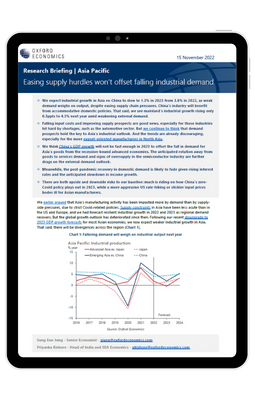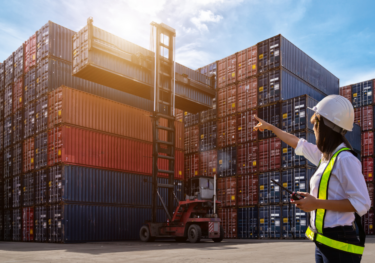Easing supply hurdles won’t offset falling industrial demand in APAC

We earlier argued that Asia’s manufacturing activity has been impacted more by demand than by supply-side pressures, due to strict Covid-related policies. Supply constraints in Asia have been less acute than in the US and Europe, and we had forecast resilient industrial growth in 2022 and 2023 as regional demand recovers. But the global growth outlook has deteriorated since then. Following our recent downgrade to 2023 GDP growth forecasts for most Asian economies, we now expect weaker industrial growth in Asia. That said, there will be divergences across the region.
What you will learn:
- We expect industrial growth in Asia ex-China to slow to 1.3% in 2023 from 3.8% in 2022, as weak demand weighs on output, despite easing supply chain pressures.
- Falling input costs and improving supply prospects are good news, especially for those industries hit hard by shortages, such as the automotive sector. But we continue to think that demand prospects hold the key to Asia’s industrial outlook. And the trends are already discouraging, especially for the more export-oriented manufacturers in North Asia.
- We think China’s GDP growth will not be fast enough in 2023 to offset the fall in demand for Asia’s goods from the recession-bound advanced economies. The anticipated rotation away from goods to services demand and signs of oversupply in the semiconductor industry are further drags on the external demand outlook.
Tags:
Related Resouces


Post
China-India – Expanding the middle classes
Indian consumers' spending power is far behind that of their Chinese counterparts, and we are sceptical about the pace of catch-up. Even if the Indian economy achieves the ambitious growth targets set, there are few signs that record levels of income inequality will reverse soon.
Find Out More
Post
Europe-China interdependence will evolve but remain
We think the EU-China economic relationship will experience more friction in the future due to structural changes to China's economy, EU fears about Chinese goods imports undercutting European industry, and national security concerns. However, the EU and China will continue to display high levels of interdependence, providing a strong incentive to avoid major disruptions.
Find Out More